Sushi ginger: Established in 2005,the agricultural product deep processing department covers an area of 230 acres, based on the Japanese sushi series, the domestic traditional Pickled Garlic, cucumber and radish series deep processing, to create a multi-variety international professional cuisine manufacturer. After years of development, it has successfully achieved an average annual export more than 10,000 tons, and has become leading company in export of pickled products. The company introduces advanced equipment such as slicers and X-ray foreign body detectors from Japan, with an annual production capacity of more than 30,000 tons, which fully meets needs of different customers for quality and delivery time. The pickled products have obtained HACCP, HALAL, BRC, Kosher and other international mainstream certifications. They are exported to more than 100 countries and regions such as Japan, the United States, and the European Union etc. ,and has been widely welcomed by domestic and foreign markets.
Pickled Ginger Vegetables,Pickled Garlic Vegetables,Pickled Radish Vegetables,Pickled Cucumber Vegetables Laiwu Manhing Vegetables Fruits Corporation , https://www.manhingfood.com
First, the trend
1, rape Sclerotinia: moderate occurrence occurs. As the previous period of continuous low temperature and rainy weather affected the growth of rapeseed, the resistance to disease decreased and the severity of the disease increased compared with last year. The city station survey area surveyed on March 20, the disease rate was 2.6% (range 0-5.3%), which was basically the same as last year's 2.5%. At present, there are sufficient bacteria in the field, and rape is in the bud to flowering stage. With the increase of temperature in late March and early April, rape blossoms gradually and the disease condition will further develop. If rainy weather during flowering, it is more conducive to sclerotiorum occur.
2. Downy mildew and aphids of rapeseeds: both occurred moderately. The city station survey area on March 20 survey, downy mildew disease rate of 3% (range 0 to 6%), the degree of illness is similar to last year. At present, in addition to individual plots, the occurrence of locusts is generally lighter, and the number of pupa strains is 230, which is significantly reduced compared with the previous years. As temperatures rise, pests and diseases will continue to develop and should be dealt with simultaneously.
3, faba bean leaf disease: occurs in the middle. The city station survey area surveyed on March 20 this year, compared with last year, the faba bean leaf disease was heavier than that of last year, the disease rate of red spot disease was 100%, and the incidence rate of leaf was 45.6% (range 36.2-52.4%), which was slightly lower than the same period of last year. The growth period of broad bean is delayed than that of the normal year, and it is currently in the bud stage, with a long-term deviation. With the high temperature in the late March, the plant growth is lush, and flowering gradually, it will aggravate the occurrence and damage of leaf diseases such as broad bean spot.
Second, prevention advice
1. Agricultural control: Remove old leaves, yellow leaves, and diseased leaves to reduce the number of pathogenic bacteria; drain drainage, increase fertilization, and increase plant disease resistance.
2. Chemical control: Sclerotinia sclerotiorum is treated once at the beginning of the flowering period, and the severe disease field is well-prepared for the second time during the flowering period; the broad bean leaf disease is treated once in the initial flowering period and during the flowering period.
Pharmaceutics formula: rapeseed sclerotinia disease use 50% Suo Keling wet powder 1000 times or 50% carbendazim wet powder 500 to 600 times liquid or 40% sclerotium net wet powder 1000 times spray; faba bean leaf disease It can be sprayed with 70% thiophanate-methyl WP 500 to 600 times or 50% carbendazim WP 500 to 600 times or 75% chlorothalonil wettable powder 600 times. Pay attention to the combination of diseases such as downy mildew and aphids.





Do a good job in the prevention and treatment of pests and diseases of rapeseed and broad beans
According to a recent survey and analysis, this year's rapeseed pests in our city mainly include sclerotiorum, downy mildew, and aphids, and disease is more important than insect pests; broad bean is dominated by leaf diseases such as red leaf spot disease. Scallop sclerotia and faba bean leaf disease are expected to occur in the middle of this year, and other diseases are moderate to moderate.